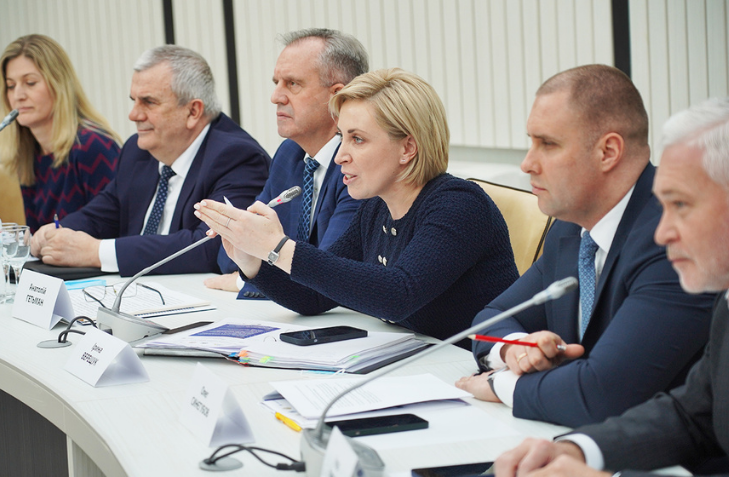ON JANUARY 21, KHARKIV HOSTED A ROUNDTABLE DISCUSSION “STATE TRANSITION POLICY AS A BASIS FOR REINTEGRATION OF THE TEMPORARILY OCCUPIED TERRITORIES OF UKRAINE” CHAIRED BY IRYNA VERESHCHUK, VICE PRIME MINISTER OF UKRAINE AND MINISTER FOR REINTEGRATION OF THE TEMPORARILY OCCUPIED TERRITORIES OF UKRAINE. THE EVENT WAS SUPPORTED BY THE EU PROJECT “PRAVO-JUSTICE”, THE DONBAS REGIONAL COUNCIL FOR JUSTICE REFORM (RRJ) AND THE NATIONAL ACADEMY OF LEGAL SCIENCES OF UKRAINE.
“A consistent and comprehensive state policy on the de-occupation and reintegration of the temporarily occupied territories of the Crimean peninsula and certain districts of Donetsk and Luhansk regions is extremely important. We are currently working on improving the government’s draft law “On the Principles of State Policy for the Transition Period”. At the same time, I started to develop a legislative framework for amnesty and convalidation. These are issues of concern to both residents of the temporarily occupied territories and citizens of Ukraine in general. The Government’s activities, in particular, are aimed at solving specific problems of citizens and sending clear signals about the consequences of certain actions of people who are currently in the temporarily occupied territories.”Iryna Vereshchuk, Vice Prime Minister of Ukraine, Minister for Reintegration of the Temporarily Occupied Territories of Ukraine, said.

In her welcoming remarks, Pawlina Rehor, Counselor at the Delegation of the European Union to Ukraine, outlined the main areas of EU support for the implementation of justice reforms in Ukraine at the national and regional levels: “At the regional level, the EU Pravo-Justice Project helps to engage the legal community in shaping justice policy through the activities of the Regional Justice Reform Councils, including the participation of representatives from Donbas. We see great value in a bottom-up approach to policy-making. This allows lawyers from the regions to draw attention to specific problems and propose possible solutions.”. In 2021, Donbas RRRP established sustainable cooperation with the Ministry of Reintegration of the Temporarily Occupied Territories of Ukraine. In particular, representatives of the RRRP developed and submitted to the Ministry:
- Package of Recommendations on the Draft Law “On the Principles of State Policy for the Transition Period” (up to two versions).
- Vision of the conceptual framework for legislative regulation of amnesty for persons who have committed certain offenses in connection with the temporary occupation – for the Ministry of Reintegration to develop a relevant draft policy proposal.
“Regional Justice Reform Councils are not only about ensuring a bottom-up approach to policy making. This is a two-way movement that allows central authorities to check their decisions with the opinion of experts and lawyers in the regions. And we see this cooperation in action right now,” emphasized Erik Svanidze, c. о. Head of the EU Project “Pravo-Justice”. During the roundtable, Olena Fonova, PhD in Law, Judge of the Economic Court of Luhansk Oblast, Donbas RRRP Coordinator, raised the issue of convalidation (recognition as valid) of transactions whose invalidity is related to their execution in the temporarily occupied territories. “The issue of validation of transactions concluded in the uncontrolled territories is very important and relevant, because for 8 years it has been almost impossible for Ukrainians to legalize the housing sold in those territories in Ukraine. At the same time, there is no easy answer as to what kind of transactions these should be and what should be the procedure for their validation. That is why the discussion of this issue in the scientific community, among practitioners, is an important step towards the implementation of the procedure of convalidation and prevention of possible risks from such implementation,” said Olena Fonova. Larysa Nalyvaiko, Doctor of Law, Professor, Vice-Rector of the Dnipro State University of Internal Affairs, member of the Dnipro RRRP, made a presentation on the constitutional and legal framework for the reintegration of the temporarily occupied territories of Ukraine: “Today, it is important for Ukraine to formulate a reintegration policy coordinated at all levels, with the involvement of persons affected by the conflict.” The event also discussed the Venice Commission’s opinion on the government’s draft law “On the Principles of State Policy for the Transition Period.” “Unfortunately, it was not fully positive for us. But this is also a positive thing, because we now have a lot of work to do, using the conclusion of the Venice Commission, the accents you have set. I sincerely hope that during the preparation for consideration in the parliament, the draft law will be in the form recommended to us by the Venice Commission,” Iryna Vereshchuk emphasized. For reference:The Regional Justice Reform Councils (RJCs) were established with the support of the EU Pravo-Justice Project and operate in Chernivtsi, Dnipro, Kharkiv, Lviv, Odesa oblasts and Donbas. To date, members of the Councils have been actively involved in the preparation of a draft law on mediation, amendments to the Bankruptcy Code, proposals to improve legislation on enforcement proceedings, the introduction of an electronic court, and discussions on the concept of transitional justice. The RECs act as permanent working groups that promote the implementation of reforms in accordance with the bottom-up principle: by bringing region-specific challenges and their potential solutions to the level of central authorities.



